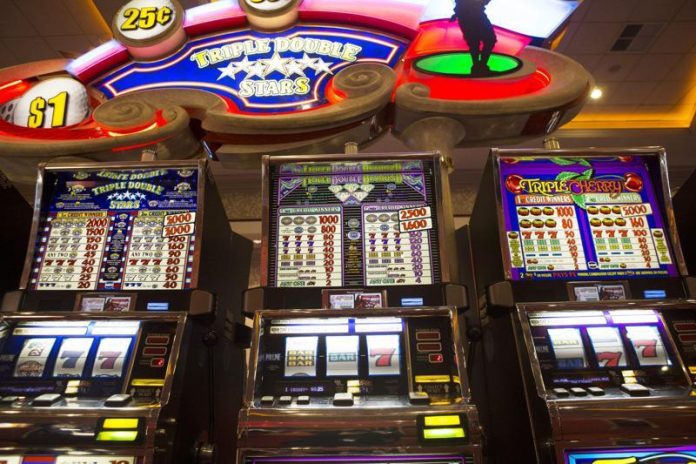The Gazette offers audio versions of articles using Instaread. Some words may be mispronounced.
DES MOINES — Statewide gaming revenue dipped for the third consecutive year in the state budget year that just ended, according to recently published state figures.
That, coupled with other pressures on the gaming industry in Iowa, is concerning for many of the 19 state-licensed casinos across the state, according to one key industry spokeswoman.
But officials with the Cedar Crossing Casino and Entertainment Center, which is scheduled to open in Cedar Rapids on New Year’s Eve of 2026, remain optimistic about jumping into a state gaming atmosphere that is on a slight downward trend but still outpaces pre-pandemic levels.
Iowa’s 19 state-licensed casinos — Cedar Crossing will become the 20th when it opens — recorded $1.679 billion in total adjusted revenue in the state fiscal year that ended June 30, according to figures published recently by the Iowa Racing and Gaming Commission, the state body that oversees gaming in Iowa.
That is down 2.6 percent over the previous state budget year and represents the third consecutive year that overall gaming revenue in Iowa has dropped year-over-year.
However, statewide gaming revenue remains 15.2 percent above pre-pandemic levels. The casinos produced $1.457 billion in total adjusted revenue in the 2019 state budget year, which was the last year of regular growth before those numbers bottomed out during the pandemic then spiked in the first year when casinos reopened.
Statewide gaming revenue cratered to $1.163 billion in the 2020 state budget year then soared in consecutive years, peaking at $1.766 billion in the 2022 state budget year.
The numbers are for casino gaming only and do not include sports betting in Iowa.
Mary Earnhardt, president and CEO of the Iowa Gaming Association, said that despite the dips in overall revenue the past three years, the fact that figure remains above pre-pandemic levels is a signal that the gaming industry in Iowa is strong.
“What we are seeing is very much in line with what has been described over the past couple of years as a rightsizing after the unprecedented spike in gaming revenue that followed the pandemic,” Earnhardt said in emailed responses to questions from The Gazette. “(The 2022 state budget year) was a record year, and while revenues have softened slightly since then, they continue to remain well above pre-pandemic levels, indicating strength and stability in Iowa’s gaming industry.”
Casino admissions also were down statewide in the recently concluded state budget year, by 2.1 percent over the previous year. And the state tax revenue produced by gaming was down 5 percent.
Q Casino in Dubuque, which is in the midst of a multiyear, $83 million renovation and expansion, bucked the statewide trends: its revenue increased 5.2 percent in the recently concluded state budget year and its admissions jumped 14.6 percent.
Cedar Crossing officials remain optimistic
Kim Pang, vice president of development for Peninsula Pacific, parent company of the Cedar Crossing Casino, also noted that gaming revenues continued to be well above pre-pandemic levels. And he noted that Cedar Crossing is projected to increase gaming revenues in Iowa.
“At the end of the day, we feel that we enhance the state of Iowa by opening Cedar Crossing,” Pang said. “We believe we’re still in a growth stage in Iowa.”
Two market studies commissioned by the Iowa Racing and Gaming Association, published in January, projected the Cedar Crossing Casino will increase overall state gaming revenue by roughly $50 million to $60 million.
“We believe that Cedar Crossing will enhance — maybe not make up for the losses on the Western Iowa side — but definitely bring … additional revenue to the state of Iowa,” Pang said. “That’s the impact of Cedar Crossing.”
Both market studies projected the new casino in Cedar Rapids will cannibalize some gaming from other Iowa casinos.
“There is a concern as this comes at a time when Iowa’s population remains stable and pressures from surrounding states are entering and expanding in the gaming industry,” Earnhardt said.
Nebraska casinos having an impact
Iowa casino owners already have been feeling the impact of new casinos: in neighboring Nebraska, which recently legalized gaming.
The Council Bluffs casinos were among those that saw the largest revenue declines in the recently concluded state budget year: Harrah’s Council Bluffs Casino & Hotel’s revenue fell 6 percent and Council Bluffs’ Horseshoe Casino revenue fell 4.5 percent.
Earnhardt also noted economic pressures like inflation having an impact on overall gaming revenue.
“However, Iowa’s casino industry continues to perform at a high level, with consistent visitor traffic, strong sports wagering growth, and significant capital reinvestment in properties across the state,” she said. “We view this as part of the natural lifecycle of a mature and responsibly regulated industry, not a sign of contraction, but one of stabilization.”
Comments: (515) 355-1300, erin.murphy@thegazette.com
Get the latest Iowa politics and government coverage each morning in the On Iowa Politics newsletter.
